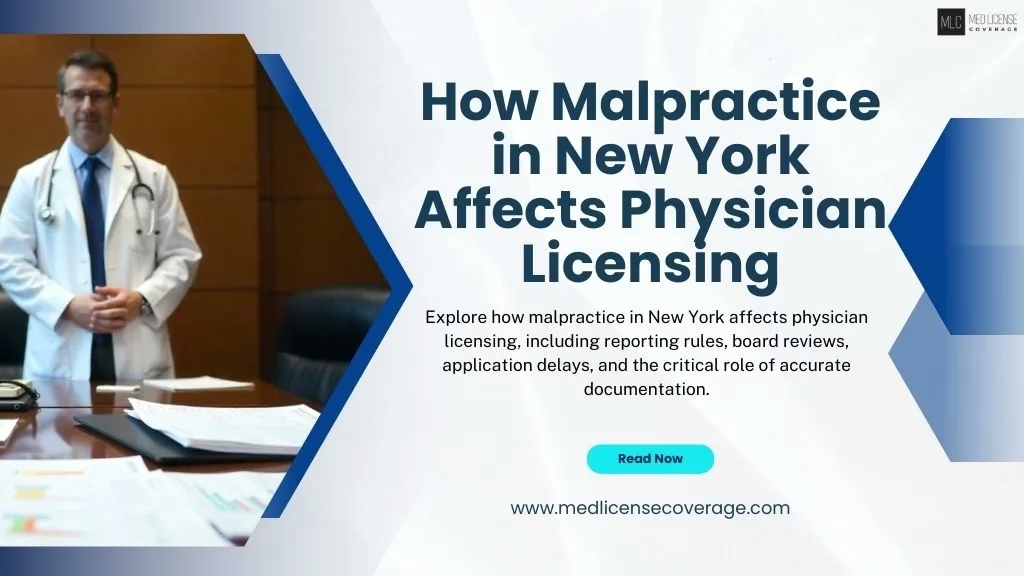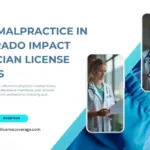Malpractice in New York extensively impacts the licensing of physicians. license choices” with “licensing decisions. Understanding this impact is essential for compliance and professional balance.
Malpractice in New York: State-Specific Oversight
New York keeps strict oversight of malpractice claims. The Office of Professional Medical Conduct (OPMC) oversees investigations, licensing outcomes, and disciplinary actions for physicians. Even a single grievance can prompt scrutiny. Multiple claims bring about formal inquiries.
Physician Licensing and Malpractice Reports
Physician licensing in New York requires complete disclosure of malpractice records. This consists of settlements, judgments, and disciplinary actions from other states; any omission or misrepresentation results in immediate delays or denials in processing. Credentialing authorities verify all claims earlier than granting licenses.
Role of Malpractice History in License Approval
Licensing boards observe the frequency and severity of malpractice claims. Repeated errors, negligence, or unethical behavior invite disciplinary action. Boards may suspend or revoke licenses if misconduct is evident. A verified malpractice history creates danger for license candidates.

Mandatory Reporting Requirements
New York law mandates reporting malpractice payouts. Hospitals, insurance companies, and physicians must record claims to the OPMC. Failure to file leads to disciplinary moves. These reports impact licensing decisions for physicians during application reviews.
Malpractice Investigations and Licensing Delays
An open malpractice investigation causes Malpractice Delay in physician licensing. Boards may additionally pause or deny licenses until investigations finish. Even dismissed claims should be disclosed and documented. Delays increase if documentation is incomplete or lacking.
Impact of Settlements on Licensing
Settling a malpractice case no longer casts off licensing results. New York forums treat settlements severely. Each case undergoes an overview of potential patterns. High-fee settlements often increase concerns about doctor competence and safety. Licensing selections reflect this risk.
Credentialing and Background Checks
Hospital credentialing includes malpractice history reviews. Credentialing committees validate claims, settlements, and court decisions. Inconsistencies result in red flags. In New York, background checks include verification of litigation results, prior licenses, and professional conduct facts.
Malpractice Risk by Way of Medical Specialty
Some specialties face higher malpractice costs in New York. Surgery, obstetrics, and emergency medicine are commonplace objectives for claims. Physicians in those regions undergo additional scrutiny during licensing. Boards keep in mind the specialty risk factors during utility evaluation.
License Suspension Due to Malpractice
Malpractice in New York can result in a brief or permanent license suspension. Boards examine damage severity, repeated conduct, and ethical violations. Often, suspension occurs even without a formal conviction: administrative choices and awareness of public safety.
Corrective Actions After Malpractice
Physicians can take corrective steps to mitigate malpractice impact. Remediation packages, ethics guides, and supervised exercise are not unusual techniques. Documentation of corrective action supports licensing selections. New York boards value proven commitment to professional development.
Physician Licensing Standards in New York
The New York State Education Department governs physician licensing. Licensing necessities include background checks, medical education verification, and background checks. Malpractice records become a critical factor in the software record. Licensing is denied if risks seem unaddressed.
Hospital Credentialing and Licensing Ties
Hospital credentialing and physician licensing intersect. A flagged malpractice case during credentialing can lead to reporting to state forums. Loss of hospital privileges often triggers a licensing assessment. New York calls for credentialing bodies to report suspensions and resignations.
Public Access to Malpractice Records
The New York State Physician Profile website provides public access to malpractice records. Patients, employers, and credentialing committees use this platform. Transparency will increase accountability; however, it raises issues of equity in instances without proven negligence.
Delays in Multi-State Applications
Physicians making use of it in multiple states face increased scrutiny. New York malpractice cases need to be disclosed to all relevant forums. Even if resolved regionally, other states may also deny or postpone licensing. Uniform disclosure guarantees smoother processing across jurisdictions.
Consequences of Non-Disclosure
Failure to reveal malpractice cases during licensing applications for physicians leads to immediate consequences. New York considers non-disclosure a breach of professional integrity. Penalties consist of license revocation, economic fines, or disqualification from future applications.
Legal Representation in Malpractice Cases
Legal counsel performs a vital function for the duration of malpractice cases. Representation ensures that rights are protected and documentation is correct. Strong defense for the duration of hearings may affect licensing outcomes. Professional prison help is regularly required for appeals or critiques.
Appeals and Licensing Hearings
Physicians denied a license because of malpractice may additionally request a hearing. New York boards conduct formal hearings with panel evaluations. Evidence, witness statements, and medical records are evaluated. Appeals can reverse denial if evidence supports safe practice.
Preventive Risk Management
Preventing malpractice starts with risk management. Accurate documentation, clean conversation, and updated clinical information are key. In New York, ongoing education and compliance with hospital coverage reduce the risk of complaints.
Role of Physician Licensing Services
Physician licensing services assist candidates who are facing delays related to malpractice issues. These services handle documentation, verifying credentials, and ensuring timely submissions. Licensing professionals manipulate appeals, accumulate references, and reveal board responses to malpractice disclosures.
Medical License Application Process
Medical license application in New York entails multiple verification steps. Educational credentials, postgraduate training, malpractice statistics, and disciplinary history are reviewed. Each detail should meet the country board’s requirements for approval.
Steps to Recover from a Malpractice Case
Recovery after a malpractice case consists of:
- Completing remediation packages
- Submitting letters of recommendation
- Participating in continuing training
- Demonstrating adherence to ethical standards
- Boards review this proof before making licensing decisions.
Ethical Guidelines and Public Trust
New York emphasizes ethics in healthcare. Physicians are expected to uphold patient protection, confidentiality, and honesty. Violations lead to malpractice claims and damage the public’s trust. Ethical lapses drastically affect licensing eligibility.
Continuing Medical Education Requirements
License renewal in New York includes Continuing Medical Education (CME). Physicians need to enroll in approved courses frequently. CME additionally performs a role in remediation after malpractice. Boards track CME participation intently at some point during licensing reviews.
Documentation Accuracy and Compliance
Accurate documentation protects physicians from false malpractice claims. Errors or omissions boost legal responsibility and complicate licensing. In New York, unique facts guide defense in board opinions and court hearings.
Strengthening Application Success
Enhancing success in licensing requires proactive measures:
- Disclose all malpractice information.
- Provide clear supporting documentation.
- Engage medical physician licensing services.
- Maintain professional behavior and education.
This method strengthens applications, particularly in malpractice-sensitive states like New York.
Conclusion
Malpractice in New York at once influences physician licensing. Every declaration, settlement, or investigation is reviewed under strict state pointers. If a malpractice history is not resolved, it frequently leads to delays, suspensions, or denials.
Professional guidance, accurate documentation, and ethical conduct improve consequences. Physician licensing services streamline application processes and decrease risks. State-specific compliance stays vital for long-term scientific career fulfillment.
FAQs
1. How does malpractice in New York affect medical doctor licensing?
Malpractice in New York triggers board investigations, delays applications, and might lead to suspensions or denials. Verified claims grow to be a part of the permanent report reviewed at some point in each licensing or renewal process.
2. Are malpractice settlements said during licensing in New York?
Yes. All settlements should be reported to the New York State Board. Even if no act of contrition takes place, every case is evaluated for risk factors affecting physician licensing and credentialing.
3. Can a physician’s license be denied because of something beyond malpractice?
Yes. Repeated or excessive malpractice cases can also bring about license denial. Boards observe styles, corrective movements, and patient damage earlier than making licensing selections in New York.
4. What role do physician licensing services play in malpractice cases?
Physician licensing services help control documentation, respond to board inquiries, and comply. These offerings reduce delays, ensure accuracy, and improve application strength for the duration of malpractice-associated opinions.
5. How do malpractice delays impact hospital credentialing in New York?
Malpractice delays stall credentialing evaluations. Hospitals often suspend appointments or privileges until they resolve or address the malpractice case through board correspondence and current physician licensing documents.
6. Can a physician regain a license after malpractice in New York?
Yes. Reinstatement calls for corrective action, training, and, every so often, probation. Boards verify rehabilitation efforts and compliance earlier than restoring physician licensing after confirmed malpractice in New York.







